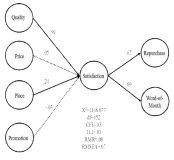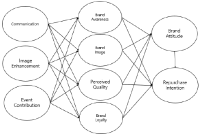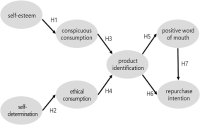
The purpose of this study was to examine the effect of marketing mix on satisfaction, repurchase intention, and word-of-mouth intention. Through the convenience sampling method, a total of 350 spectators from 2013 Son Yeon-Jae Gala Show. Of 350 surveys that were collected, 20 were discarded resulting in 330 usable surveys. By employing independent t-test, confirmatory facor analysis, structural equation modeling through SPSS 20.0 and AMOS 20.0, this study found followings. First, there was difference according to past experience of attending the gala show or watching it on media. Second, quality of performance and place in marketing mix were positively related to satisfaction. Third, satisfaction had a positive influence on repurchase intention and word-of-mouth intention. Fourth, quality of performance and place in marketing mix had a positive influence on repurchase intention and word-of-mouth intention mediated by satisfaction.


Purpose The purpose of this study was to provide title sponsorship marketing strategies by defining the relationship between professional volleyball title sponsorship, brand equity, brand attitude, and repurchase intention. Methods This study distributed 390 questionnaires to 2018-2019 V-League audiences and a total of 313 questionnaires were used as final validity sample. For data analysis, SPSS 21.0 and Amos 18.0 were used for frequency analysis, reliability analysis, confirmatory factor analysis, and structural equation analysis. Results First, title sponsorship had significant influence on brand equity, therefore hypothesis 1~3 were accepted, except for 1-3(perceived quality) and 1-4(brand loyalty). Second, among brand equity subfactors, hypothesis 4-1(brand awareness) and 4-4(brand loyalty) had significant influence on brand attitude which made hypothesis 4 partially accepted . Third, among brand equity subfactors, only brand image(hypothesis 5-2) had significant influence on repurchase intention which made hypothesis 5 partially accepted. Lastly, brand attitude had significant influence on repurchase intension, which made hypothesis 6 accepted. Conclusions It is anticipated that based on the result of the study, effective marketing strategy can be developed for title sponsorship companies in the future.


Purpose The purpose of this study was to empirically analyze the relationship between a sports-for-all club members self-esteem and self-determination, conspicuous consumption, ethical consumption, product identification, positive word of mouth & repurchase intention through structural equation model analysis. Methods For this purpose, this study set 279 members at the nine sports-for-all club located in national capital region as the research subjects. In an effort to verify the proposed structural model, this study used SPSSWIN Ver. 23.0 and AMOS 18.0. Results First, self-esteem had a positive effect on conspicuous consumption. Second, self-determination had a positive effect on ethical consumption. Third, conspicuous consumption had a positive effect on product identification. Fourth, ethical consumption had a positive effect on product identification. Fifth, product identification had a positive effect on positive word of mouth. Sixth, product identification didn’t had a positive effect on repurchase intention. Seventh, positive word of mouth had a positive effect on repurchase intention.


Purpose The purpose of this study was to analyze the relationships among sport-products self-congruence, product love, product trust, and purchase behavior of sports-for-all club members through structural equation model analysis. Methods A survey was conducted targetting 227, men & women in their twenties who are members of MTB, Tennis, Badminton, Golf in at the 8 in Seoul metropolitan area. For sampling method, convenience sampling method was used, while the questionnaire was self-administered. In an effort to verify the proposed structural model, this study used IBM SPSSWIN Ver. 21.0 and AMOS 18.0. Results First, actual self-congruence has positive influence on the product love. Second, ideal self-congruence didn't have positive influence on the product love. Third, social self-congruence has positive influence on the product love. Fourth, product love has positive influence on the product trust. Fifth, product trust has positive influence on the positive word-of-mouth. Sixth, product trust has positive influence on the repurchase intention. Seventh, product trust has positive influence on the attitudinal loyalty.

